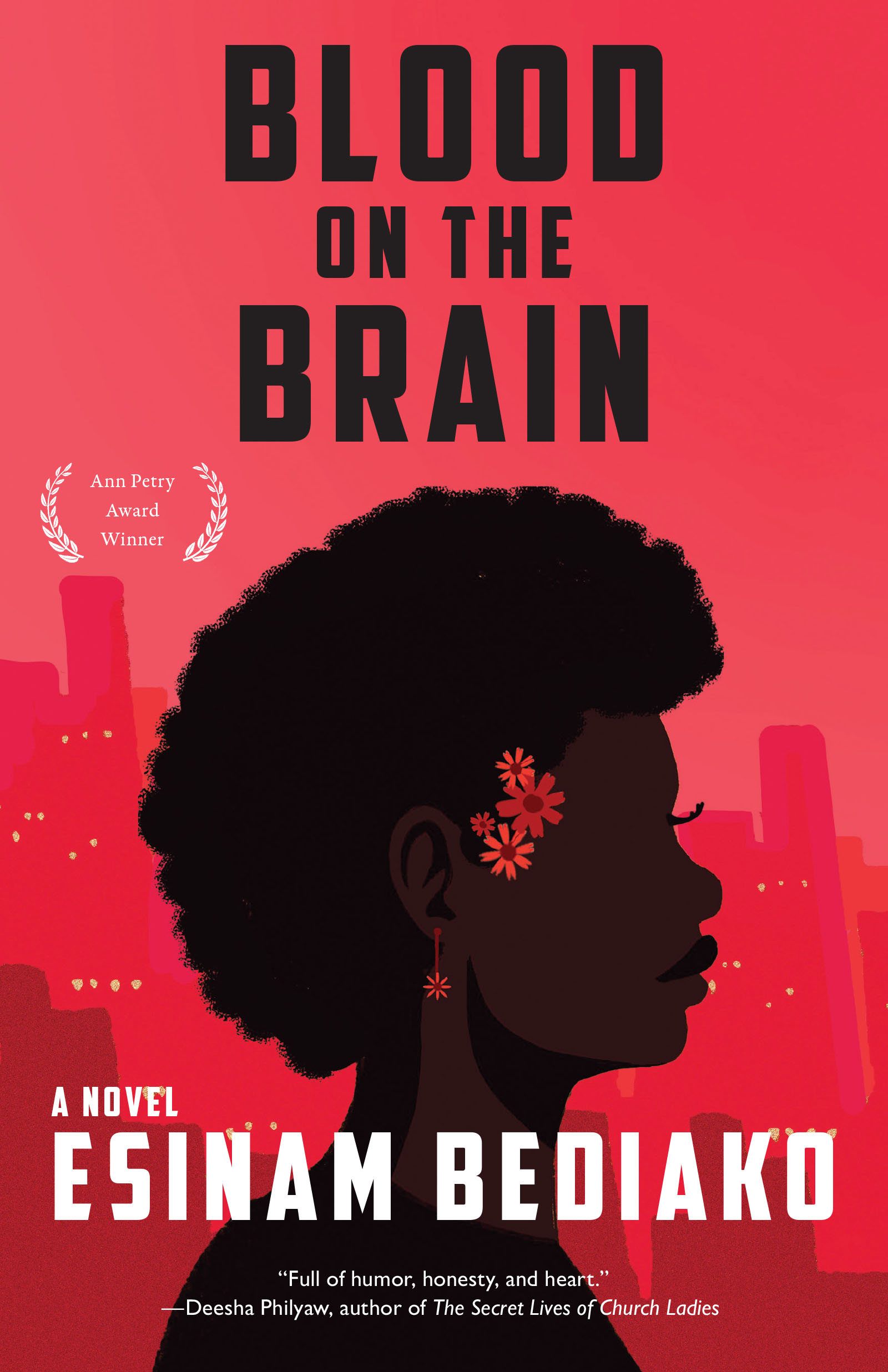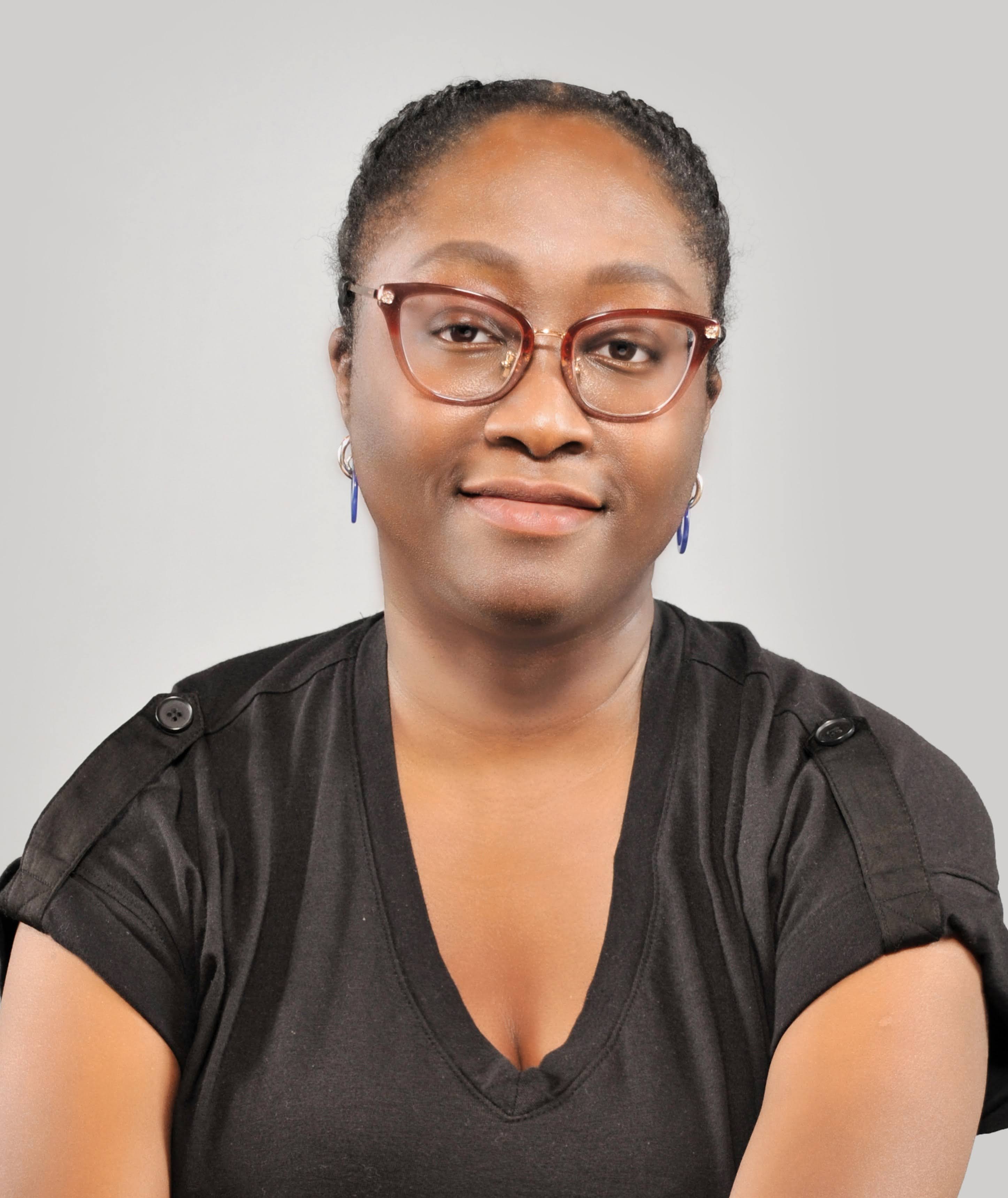
An interview with Esinam Bediako
September 9, 2024
Ghanaian American author Esinam Bediako has been honored for her debut novel Blood on the Brain, set to launch in September of 2024 in Brooklyn, New York. Born and raised in Metro-Detroit, Bediako’s story of a young woman, Akosua, who is also a Ghanaian American from Detroit, highlights challenges of growing into adulthood in the United States. In addition to typical romantic and educational pursuits, the story’s protagonist asks difficult questions about identity and belonging. Here, we present a conversation with Esinam Bediako about her experience writing the novel, and how her own life experiences played a role in story and character development.
R: Esinam, thank you for joining me to talk about your new book Blood on the Brain. I enjoyed it very much, and appreciate the level of intimacy that the story holds, as it is told primarily as internal thoughts of the main protagonist, Akosua. As the author, how do you relate to her character?
E: I guess I sort of created her as an alter ego. I started this book when I was in my MFA program, so I was actually in my 20s then, like Akosua. At that time, I was writing what people call “Mary Sue” characters, when the characters are too innocent, free of flaws, and static. My teachers told me that I needed to find a way to make these protagonists come to life more, and so I set up Akosua to have similar demographics as me, but to approach things in a very different way than I typically would. Her character is more impulsive and daring.
R: You have so many well developed characters in the book. I feel like I can say that I know someone in my life who is just like each of them somehow and so I imagine these people that I know as I am reading, laughing about the similarities. How do you approach developing such well rounded personalities? Are they based on people you know?
E: For this book, I didn’t really think about that before I started writing. I started writing the book 17 or 18 years ago and then started working on it again during the pandemic. After so much time away from it, I was able to look at the characters from a more critical perspective. I was initially having trouble writing about Wisdom, or Akosua’s mom, or even Ella. Even though the story is told through Akosua’s perspective, I needed to show that these characters also have other things going on outside of Akosua, things that Akosua doesn’t fully absorb because she’s so in her own head and her own experience. The parts that I like most about these characters are details that I added most recently, and I think that they actually became stronger characters the more that I tried to separate them from real people in my life.

R: I wanted to ask about your choice to have Akosua acquire a traumatic brain injury as part of the story. Do you have personal experience with TBI?
E: Not really, other than a sports-related concussion in high school, and it wasn’t serious. Basically at first, I knew that it was going to be a story about Akosua and her father being in her life all of a sudden and the possibility of reconnecting with him. I knew that she was going to distract herself from this conflict by fixating on her romantic life. As I was writing the first chapter, I had her fall and hit her head because I wanted a way to introduce these two important people in her life, Wisdom and Ella, who both rush in to help her. It was originally going to be this plot device and not have much more to do with the story, but the more I thought about it, I realized that falling in the shower and hitting her head could lead to a pretty bad injury. As I started researching traumatic brain injuries, I learned about how sometimes a bump to the head can seem minor and then turn out to be severe, or a fall can seem dramatic but the injury ends up being not such a big deal. That uncertainty sounded terrifying, but it also seemed like an intriguing backdrop for this story. I realized that her concussion could raise so many questions about whether her actions were a result of her injury or her personality.
R: I find it really interesting that you took that direction, because I know that there is such a low awareness of TBI as a chronic condition in general, and it really highlights the experience of someone from that perspective while also raising awareness of the symptoms.
I also learned a lot about Ghanaian culture from reading your book. You are Ghanaian-American. Did your parents emigrate to the US before you were born?
E: I was born in Detroit and grew up in Oak Park. My mom and dad came to the US in the 70s. My older sister and I have not been to Ghana that many times, maybe just three times so far, but I love my family there so much despite the disconnect of space and time and shared experiences. That is something I do have in common with Akosua, the feeling of being isolated from your family and feeling very Ghanaian but also contemplating what that means to be a first-generation U.S. citizen. I can’t speak a Ghanaian language, or make the food. If I was dropped off in the middle of Accra, I would not know where I was going.

Growing up, though, I don’t think I actually thought about my Ghanaian American identity as much as Akosua does. She’s conscious of it all throughout her childhood and young adulthood, and she feels awkward because of it. On the other hand, I rarely thought, “Oh, I’m awkward, and it’s because I’m not Ghanaian enough or not American enough.” I pretty much just thought I was awkward because I was a dork. But looking back, I realize that a similar cultural struggle may have played a role in how I felt growing up.
R: It is definitely apparent that the customs of Ghanaian culture are very present in Akosua’s life, brought in by her mother, aunties and uncles. But there are also a lot of people around her in the University that have a similar background. Was that how it was for you growing up?
E: There is actually a pretty decent size Ghanaian American community in Metro-Detroit, but I don’t think that I had as much experience with these customs as Akosua has. I think my parents were more involved in the community when they were younger, but as they had kids, things got busier, which pulled us a bit away from the community. At least a couple of times a week, my mom cooked some Ghanaian food, like jollof rice, or black eyed peas and plantains, or spinach stew. Yet when developing the story, I still had to research a lot of the other Ghanaian foods, and I had to research the Ewe language.
Some of the details came from learning from Ghanaian Americans and even Nigerian Americans in college. One aspect of the culture that I was trying to relay was the idea that even though the community is spread out from city to city, there are still people all around who know your business, haha. I found that to be interesting to write about.
R: Is there anything that you want to say about the book? What kind of things do you want people to take away from reading the book?
E: One of the reasons why I returned to the book after so many years is that I think Akosua has so many insecurities about her looks and her choices. I used to teach high school, and some of those students are now in college. A couple of them have told me that they think it’s weird to hear their mothers talk about feeling self-conscious about their body or having trouble speaking up for themselves. They’ve grown up in a world where more focus on gender equality, body positivity, and mental health have empowered them to challenge traditional norms. Of course I think all of this is amazing. At the same time, I think this shift can sometimes make it harder for girls and women to express their insecurities, as vulnerability around these issues can sometimes seem like weakness. I think it’s important to recognize that even though things have improved in terms of self-image, people like Akosua still struggle.
Also, Akosua has had an arrested development, and this is not something that we often see with Ghanaian American women or Black women in general, because there is an expectation for women in our cultures to assume the caretaker role from a young age and to appear strong, emotionally restrained, and resilient at all times. I really wanted this novel to offer an alternative representation, to show that the strong, Black woman archetype is not everyone’s experience.
The official launch of Blood on the Brain by Esinam Bediako will take place at Powerhouse Arena in Industry City, Brooklyn on September 19, 2024.
There will also be an event to introduce Blood on the Brain to the Metro-Detroit community at Book Beat in Oak Park, Michigan on October 10, 2024.